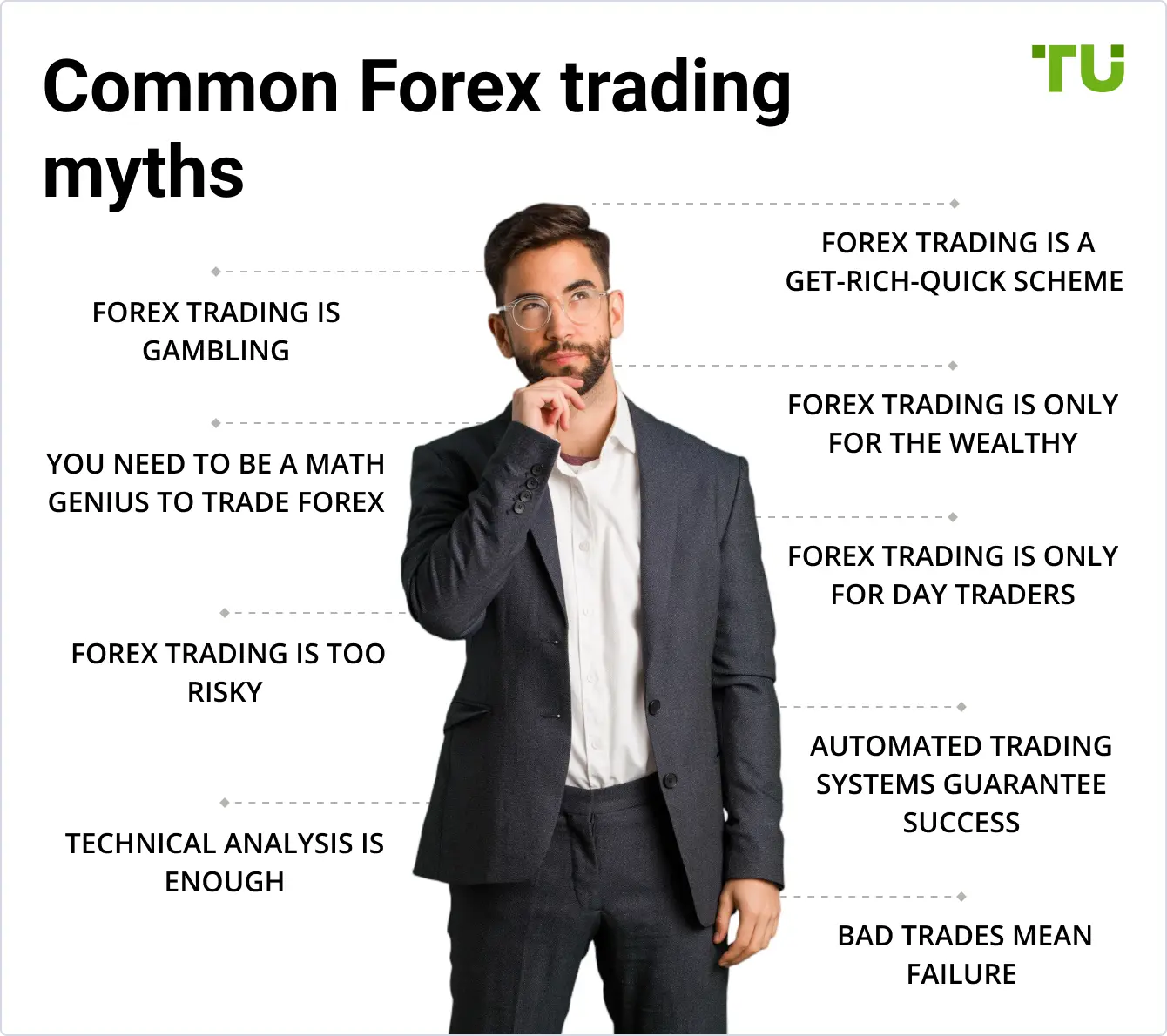Common Forex Trading Myths



Editorial Note: While we adhere to strict Editorial Integrity, this post may contain references to products from our partners. Here's an explanation for How We Make Money. None of the data and information on this webpage constitutes investment advice according to our Disclaimer.
Forex trading is often surrounded by myths that can mislead traders, such as the belief that it’s a quick way to get rich, that market manipulation is rampant , or that success only comes with highly complex strategies.
Forex trading, the practice of buying and selling currencies, has become increasingly popular due to its potential for significant profits and the allure of financial independence. However, along with its rise in popularity, numerous myths and misconceptions have emerged that can mislead and discourage both novice and experienced traders.
This article aims to debunk these myths and provide a clear understanding of what Forex trading truly entails.
 Common Forex Trading Myths
Common Forex Trading MythsMyth 1: Forex trading is a get-rich-quick scheme: Contrary to the belief that Forex trading is an easy way to make quick money, successful trading requires time, effort, and a deep understanding of the market. Many beginners are lured by promises of overnight riches, only to face disappointment. Forex trading demands years of honing skills, developing strategies, and continuously learning from the market.
Myth 2: Forex trading is gambling: While it might seem that Forex trading is akin to gambling due to its inherent risks, the reality is that successful trading is based on thorough analysis, strategic decision-making, and risk management. Traders use technical and fundamental analysis to make informed decisions, which sets it apart from gambling.
Myth 3: Forex trading is only for the wealthy: Another common misconception is that Forex trading is reserved for the wealthy. In truth, it is accessible to anyone with a small amount of capital. Many brokers offer mini or micro accounts that allow traders to start with as little as $25. Leverage provided by brokers also enables traders to control larger positions with smaller investments.
Myth 4: You need to be a math genius to trade Forex: Although Forex trading involves some basic math, such as calculating profit and loss, it does not require advanced mathematical skills. Many successful traders focus on understanding market trends, technical analysis, and fundamental analysis rather than complex calculations.
Myth 5: Forex trading is only for day traders: While day trading is a popular strategy, it is not the only way to trade Forex. Traders can also engage in swing trading, position trading, and other long-term strategies. The key is to find a trading style that suits one’s lifestyle and risk tolerance.
Myth 6: Forex trading is too risky: Forex trading does involve risk, but it is manageable with proper risk management techniques. Successful traders use tools like stop-loss orders, position sizing, and risk-reward ratios to protect their capital and minimize losses.
Myth 7: Automated trading systems guarantee success: Automated trading systems can be helpful tools, but they are not foolproof solutions. They require proper programming, testing, and constant monitoring. Traders should use these systems to supplement their own analysis and decision-making processes.
Myth 8: Technical analysis is enough: Relying solely on technical analysis can be limiting. A well-rounded trading strategy should incorporate both technical and fundamental analysis to understand the broader market context and potential movements.
Myth 9: Bad trades mean failure: Experiencing losses is a natural part of trading and does not equate to failure. Successful traders learn from their mistakes and continuously refine their strategies. The key is to manage emotions and maintain a disciplined approach.
Key сonsiderations for beginner traders
Educational resources: Continuous learning is crucial in Forex trading. Beginners should invest time in understanding market dynamics, trading strategies, and risk management. Numerous online resources, courses, and webinars are available to help new traders gain knowledge and confidence.
Understanding leverage: Leverage can amplify both gains and losses. It is essential for beginners to understand how leverage works and to use it cautiously. Overleveraging can lead to significant losses.
Basic trading strategies: Starting with simple trading strategies can help beginners build a strong foundation. Strategies like trend following, breakout trading, and moving averages are good starting points.
Starting with demo accounts: Demo accounts allow beginners to practice trading without risking real money. This helps them understand the platform, test strategies, and build confidence before transitioning to live trading.
We suggest you familiarize yourself with the comparison table with brokers offering the most convenient conditions for traders. Here you can start trading with a demo account without risks:
| Demo | Min. deposit, $ | Leverage, 1: | Min Spread EUR/USD, pips | Open account | |
|---|---|---|---|---|---|
| Yes | 100 | Up to 1:30 or up to 1:300 | 0,5 | Open an account Your capital is at risk. |
|
| Yes | No | Up to $400:1 retail, 500:1 Pro | 0,5 | Open an account Your capital is at risk.
|
|
| Yes | No | Up to 1:200 | 0,1 | Open an account Your capital is at risk. |
|
| Yes | 100 | Up to 1:400 | 0,7 | Study review | |
| Yes | No | Depending on the asset | 0,2 | Open an account Your capital is at risk. |
Key considerations for advanced traders
Advanced risk management techniques: Advanced traders should employ sophisticated risk management techniques such as setting stop-loss and take-profit orders, using trailing stops, and calculating the risk-reward ratio for each trade.
Technical and fundamental analysis: Integrating technical and fundamental analysis provides a comprehensive view of the market. Advanced traders analyze economic indicators, geopolitical events, and market sentiment to make informed decisions.
Developing a trading plan: A well-defined trading plan is essential for success. It should include entry and exit strategies, risk management rules, and criteria for evaluating performance. Sticking to the plan helps maintain discipline and consistency.
Psychological aspects: Managing emotions and maintaining a positive mindset are crucial for long-term success. Advanced traders recognize the impact of psychology on trading performance and use techniques like journaling and mindfulness to stay focused.
Educating others about Forex realities: To tell beginners real facts about Forex and share stories for them about your success and failure.
Risks and warnings
Effective risk management is the cornerstone of successful trading. Traders should never risk more than they can afford to lose and should use tools like stop-loss orders to protect their capital.
The Forex market is not immune to scams. Traders should be cautious of offers that sound too good to be true and should always conduct thorough research before choosing a broker or investing in trading systems.
Trading with regulated brokers ensures a higher level of protection. Regulatory bodies like the Financial Conduct Authority ( FCA) and the Commodity Futures Trading Commission ( CFTC) enforce rules to safeguard traders' interests.
Don't be afraid about myth
I've encountered numerous myths that often mislead both new and seasoned traders. One common myth is that Forex trading is an easy way to get rich quickly. In reality, success in Forex requires extensive knowledge, discipline, and consistent effort. I recommend starting Forex trading with demo or cent accounts to practice and gain confidence.
Another misconception is that the Forex market is frequently manipulated by big players, making it impossible for individual traders to succeed. While market manipulation can occur, understanding market dynamics and applying sound trading strategies can significantly mitigate its impact.
Finally, many believe that only complex trading strategies can yield success, but often, simple and well-executed plans are more effective. By debunking these myths, we can foster a more realistic and informed approach to Forex trading.
Summary
Forex trading is rife with misconceptions that can mislead traders. Key myths include the idea that it's a quick path to wealth, that the market is heavily manipulated against small traders, and that only complex strategies yield success. By dispelling these myths, traders can approach Forex with a clearer, more realistic mindset.
FAQs
Is Forex trading an easy way to get rich quickly?
No, Forex trading is not a guaranteed path to quick wealth. Successful trading requires a deep understanding of the market, disciplined strategies, and consistent effort over time. Many traders face significant losses if they approach Forex with unrealistic expectations.
Is the Forex market manipulated against individual traders?
While market manipulation can occur, it is not as prevalent as some believe. The Forex market is highly liquid and competitive, which makes it difficult for any single entity to control prices for extended periods. Traders can protect themselves by developing sound strategies and staying informed about market conditions.
Do I need complex strategies to be successful in Forex trading?
No, complexity does not necessarily equate to success in Forex trading. Simple, well-executed strategies can be highly effective. The key is to develop a clear plan, stick to it, and continually refine your approach based on experience and market feedback.
Related Articles
Team that worked on the article
Parshwa is a content expert and finance professional possessing deep knowledge of stock and options trading, technical and fundamental analysis, and equity research. As a Chartered Accountant Finalist, Parshwa also has expertise in Forex, crypto trading, and personal taxation. His experience is showcased by a prolific body of over 100 articles on Forex, crypto, equity, and personal finance, alongside personalized advisory roles in tax consultation.

Dr. BJ Johnson is a PhD in English Language and an editor with over 15 years of experience. He earned his degree in English Language in the U.S and the UK. In 2020, Dr. Johnson joined the Traders Union team. Since then, he has created over 100 exclusive articles and edited over 300 articles of other authors.
Mirjan Hipolito is a journalist and news editor at Traders Union. She is an expert crypto writer with five years of experience in the financial markets. Her specialties are daily market news, price predictions, and Initial Coin Offerings (ICO).
Economic indicators — a tool of fundamental analysis that allows to assess the state of an economic entity or the economy as a whole, as well as to make a forecast. These include: GDP, discount rates, inflation data, unemployment statistics, industrial production data, consumer price indices, etc.
Swing trading is a trading strategy that involves holding positions in financial assets, such as stocks or forex, for several days to weeks, aiming to profit from short- to medium-term price swings or "swings" in the market. Swing traders typically use technical and fundamental analysis to identify potential entry and exit points.
Day trading involves buying and selling financial assets within the same trading day, with the goal of profiting from short-term price fluctuations, and positions are typically not held overnight.
Risk management is a risk management model that involves controlling potential losses while maximizing profits. The main risk management tools are stop loss, take profit, calculation of position volume taking into account leverage and pip value.
Options trading is a financial derivative strategy that involves the buying and selling of options contracts, which give traders the right (but not the obligation) to buy or sell an underlying asset at a specified price, known as the strike price, before or on a predetermined expiration date. There are two main types of options: call options, which allow the holder to buy the underlying asset, and put options, which allow the holder to sell the underlying asset.






























































































































